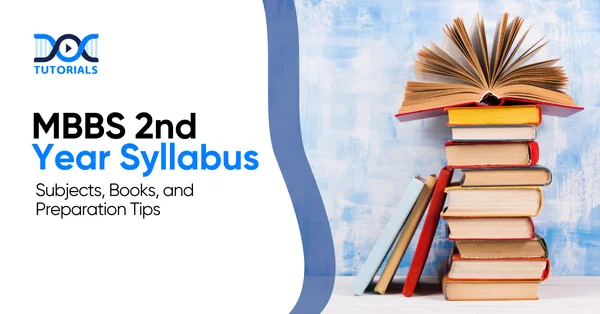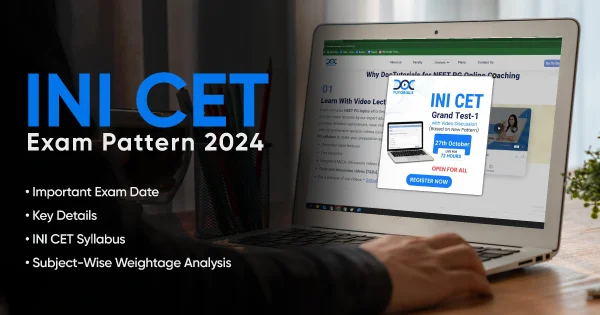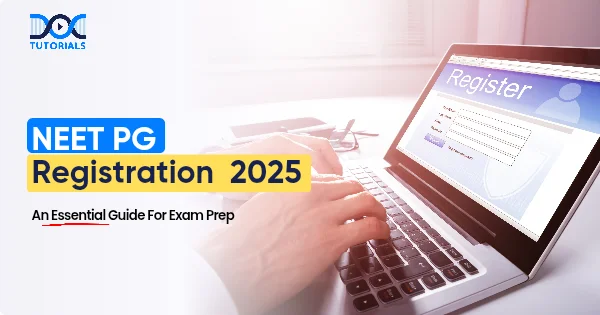MBBS 2nd Year Syllabus: Subjects, Books, and Preparation Tips

The MBBS program in India is designed to provide students with a strong foundation in medical knowledge while building essential clinical skills. Spanning 5.5 years, including a mandatory one-year internship, the course is divided into three phases: pre-clinical, para-clinical, and clinical.
According to National Medical Commission (NMC) regulations, the MBBS course comprises 19 core subjects, providing prospective doctors with both theoretical knowledge and clinical training. While the first year covers subjects such as Anatomy, Physiology, and Biochemistry, the second year (para-clinical phase) mainly involves Pathology, Microbiology, and Pharmacology.
In this article, we will learn the entire 2nd year MBBS syllabus, suggested books, and preparation tips to help you ace your exams. Keep reading for a detailed insight.
What is the 2nd Year MBBS Syllabus?
The 2nd year MBBS syllabus is mainly reserved for para-clinical courses that cover the transition from basic medical sciences to clinical practice. Para-clinical courses give an introduction to the pathophysiology of diseases, diagnostic methods, and principles of treatment, particularly pharmacological actions.
Along with theoretical class lectures, practical training, and clinical postings, students also gradually gain entry into the subsequent phases of clinical studies through these components. Practical training in the 2nd year MBBS subjects enhances confidence and renders them worthy for the practice of medicine in real life.
Students can refer to the data below to learn the comprehensive list of MBBS 2nd year subjects.
- Pathology
Some of the areas included under Pathology are:
- General Pathology
- Systemic Pathology
- Practical Training in Pathology
- Microbiology
The following are some of the major topics studied in Microbiology:
- Bacteriology
- Virology
- General Microbiology Concepts
- Laboratory Diagnosis of Viral Infections
- Basic Tests for Bacterial Identification
- Methods for Diagnosing Fungal Infections
- Bacterial and Viral Genetics
- Collection and Transport of Clinical Samples
- Microorganisms Causing Gastrointestinal Infections
- Principles of Sterilisation and Disinfection
- Pharmacology
A few of the core topics covered under Pharmacology are listed below:
- General Principles of Pharmacology
- Autacoids and Related Drugs
- Drugs Acting on Gastrointestinal and Respiratory Systems
- Cardiovascular Pharmacology
- Endocrine Pharmacology (Hormones)
- Miscellaneous Topics
- Central Nervous System Drugs
- Autonomic Nervous System Drugs
- Chemotherapy and Antimicrobial Agents
- Clinical Postings in Wards
In the second year, students have to complete 12 weeks of clinical postings in the subject of Community Medicine. This is to familiarise them with the dynamics of patient care, patterns of diseases, and public health practice in hospital wards.
- Outpatient Department (OPD)
The Outpatient Department (OPD) is an equally crucial part of second-year clinical exposure. OPD is the hospital ward where non-admitted patients are checked, diagnosed, and treated.
OPD is visited during working hours during the day and provides a chance for students to see doctors treating patients in a non-emergency case. This period teaches learners about the provision of healthcare at the primary level.
Detailed Subject-Wise 2nd Year MBBS Syllabus
The 2nd year of MBBS is a transitional phase from fundamental medical sciences to clinical practice, with emphasis on para-clinical subjects that offer a strong platform for the diagnosis and treatment of diseases.
Following is a subject-wise comprehensive MBBS second-year syllabus to guide students through worthy subjects, practical training, and clinical exposure.
- Pathology Syllabus
Pathology provides the knowledge of cellular damage, homeostatic processes, disease processes, and neoplasia with gross and microscopic characteristics for diagnosis and prognosis.
- General Pathology: The subjects taught are cell damage, amyloidosis, calcification, inflammation and repair, circulatory disorders, disorders of growth, and neoplasia.
- Systemic Pathology: Pathology of significant systems such as cardiovascular, respiratory, urinary tract, gastrointestinal tract, liver, biliary tract, and hematopathology.
- Microbiology Syllabus
Microbiology introduces students to the fundamentals of microorganisms and their role in human health and disease. It covers basic bacteriology, bacterial staining, cultivation techniques, and standard tests for bacterial identification. Students also study parasitology, virology, and mycology, as well as laboratory methods for diagnosing fungal infections.
Other important areas include the collection and transport of clinical samples, host-parasite interactions, bacterial and viral genetics, and immunity against infections, which together build a strong foundation for understanding infectious diseases.
- Pharmacology Syllabus
The students are provided with a brief introduction to pharmacokinetic and pharmacodynamic concepts, drug action variables, dosage calculation, rational prescribing, and pharmacy principles.
- General Pharmacology: Includes drug absorption, distribution, metabolism, and elimination, basic principles of drug action, adverse drug reactions, and determinants of drug response.
- Autonomic and Peripheral Nervous System: Includes parasympathetic and sympathetic nervous systems, neurohumoral transmission, skeletal muscle relaxants, and allied pharmacology.
- Central Nervous System: Includes neurotransmitters, normal drug receptors, pharmacotherapy of pain, and general anaesthetic drugs.
- Surgery Postings
This is a course that seeks to equip students with a comprehensive grasp of the aetiology, pathophysiology, and treatment of common surgical diseases, as well as fluid and electrolyte replacement. The curriculum combines a system-based curriculum with a spiral model of learning so that students can learn increasingly complex material.
Key areas of focus include the skin, head and neck region, arteries and veins, breast, oesophagus, stomach, duodenum, small intestine, colon, rectum, appendix, and anus. This exposure equips students with practical knowledge and hands-on clinical skills in surgical care.
- Outpatient Department (OPD)
OPD is a valuable component of clinical training. OPD offers medical services to inpatient candidates who are not admitted to a hospital. Students learn and assist through patient consultation, diagnosis, and treatment at specified timings on a daily basis.
Exposure to OPD enables the acquisition of practical skills in handling patients, medical examination, and information on the daily operations of hospital services.
What are the MBBS 2nd Year Books?
The second-year MBBS curriculum can be supplemented with online lectures, which provide detailed explanations of the intricacies of the concept. The recommended books for all subjects are mentioned below:
| Subject | Book Name | Author Name |
| Pharmacology | The Pharmacological Basis of Therapeutics | Goodman & Gilman’s |
| Pharmacology | Basic & Clinical Pharmacology | Bertram G. Katzung |
| Pharmacology | Fundamentals of Experimental Pharmacology | M.N. Ghosh |
| Pathology | Pathological Basis of Disease | Robbin’s |
| Pathology | Textbook of Pathology | Harsh Mohan |
| Microbiology | Medical Microbiology | Greenwood & Slack |
| Microbiology | Jawetz, Melnick, and Adelberg’s Medical Microbiology | Geo F. Brooks, Stephen A. Morse |
| Microbiology | Parasitology (Protozoology and Helminthology) | K.D. Chatterjee |
| Surgery | Short Practice of Surgery | Bailey & Love |
| Surgery | ASI Textbook of Surgery | Ed. A.K. HAI |
| Surgery | Physical Signs in Surgery | Hamilton Bailey |
What are the Best Study Tips for MBBS Students?
An MBBS degree is a substantial investment of time, effort, and resources. Even for students who have a passion to study medicine, the experience at times can be challenging and even stressful.
To be successful, you must learn how to work under pressure and develop effective study habits right from the start. Some of the expert study tips for MBBS students are mentioned below:
- Create a Study Routine
MBBS is a complex course, and responsibility handling is all about planning. Some students choose individual studies for peer learning and diverse perspectives, while others focus well individually to stay free from distractions.
Create a routine as per your choice and utilise your study time sensibly. Check your schedule regularly and make the required changes to keep making continuous progress and avoid last-minute stress.
- Attempt Difficult Topics First
The first couple of years of MBBS could be daunting because of the completely new topics and learning patterns. Professors advise attempting complex topics like Anatomy and Forensic Medicine when your mind is alert and devoting extra time to studying them. Breaking these subjects into smaller subtopics may help make it easier to study and digest.
- Ensure You Sleep Well
Sleeping is vital to cognitive ability, memory, and general health. Prioritising sleep enhances motivation, concentration, and physical health, ensuring you remain alert and productive through prolonged studying. Develop a consistent sleeping habit to maximise the effectiveness of learning and mental acuteness.
- Practice Previous Year’s Exam Papers
Working on past question papers familiarises you with the exam pattern and types of questions, giving you confidence and improving exam readiness. Analysing your mistakes from these papers can help strengthen weak areas and improve exam performance.
- Seek Advice from Your Mentors
Professors and teaching faculty are the best individuals to take advice from. They can clear your misconceptions, give study tips, and recommend reading in the form of research articles and medical blogs. Constant interaction with mentors will also provide motivation and practical tips on time management and exams.
- Take Time Off Occasionally
Hard work is required from time to time, but never-ending study with no breaks will lead to burnout. Schedule a time off with your friends and family to give your mind a break, stay motivated, and stay mentally healthy. Incorporating some hobbies or some light physical activity can reduce stress as well as increase overall productivity.
FAQs about MBBS 2nd Year Syllabus
- How many subjects are studied in the second year of MBBS?
The second year of MBBS consists mainly of 3 core subjects: Pathology, Pharmacology, and Microbiology. These are para-clinical subjects in which basic sciences are correlated with clinical practice.
- What if I fail in the MBBS 2nd Year?
If a student fails in the second year, they will have to give a supplementary exam after 4–6 months. In case of failure in the supplementary exam, the student will have to provide the whole year to clear the course.
- How many books are required for the MBBS 2nd Year?
There is no fixed number of books for the second year, as it depends on the student’s preference for leading textbooks, reference, or review books.
Typically, students use one primary textbook and sometimes one review book per core subject to cover Pathology, Pharmacology, and Microbiology.
- How many hours must one study in the 2nd year of MBBS?
The MBBS 2nd year comprises a significant amount of studies, and students should typically dedicate 6–8 hours daily to their studies. It involves lectures, practical classes, and revision classes in an effort to study in detail all para-clinical subjects.
- How many attempts are allowed in the MBBS 2nd Year exams?
The National Medical Commission (NMC) provides students with the opportunity to attempt the second-year professional exams four times. If a student is unable to pass the regular exam, they can attempt supplementary exams up to four times to successfully complete the year.
Conclusion
It is essential to be aware of the MBBS 2nd-year syllabus, subjects, and recommended books to establish a solid foundation in para-clinical medicine. With proper study planning, smart preparation techniques, and guidance from experienced professionals, students can manage the heavy coursework effectively and excel in exams.
Consistent effort and access to proper resources can make your MBBS experience more streamlined and productive. For added support, DocTutorials can serve as your study companion. We provide animated video lectures, Qbank, previous year question papers (PYQs), and live interactive sessions to help you excel in exams as well as clinical practice.
Explore DocTutorials’ MBBS curriculum today and take a sure step toward clearing your second-year MBBS syllabus!
Latest Blogs
-

INI CET Exam Pattern 2025: A Complete Guide with Subject-Wise Weightage
The Institute of National Importance Combined Entrance Test (INI CET) is your key to entering some of the most prestigious…
-

NEET PG Registration 2025: An Essential Guide For Exam Prep
The NEET PG registration, which is conducted online, is a crucial step in the exam process. Filling out the NEET…
-

NEET PG Syllabus 2026: A Must-Have Complete Guide for Exam Success
The NEET PG Syllabus acts as one of the foundation stones for aspiring postgraduate medical students like you who are…




